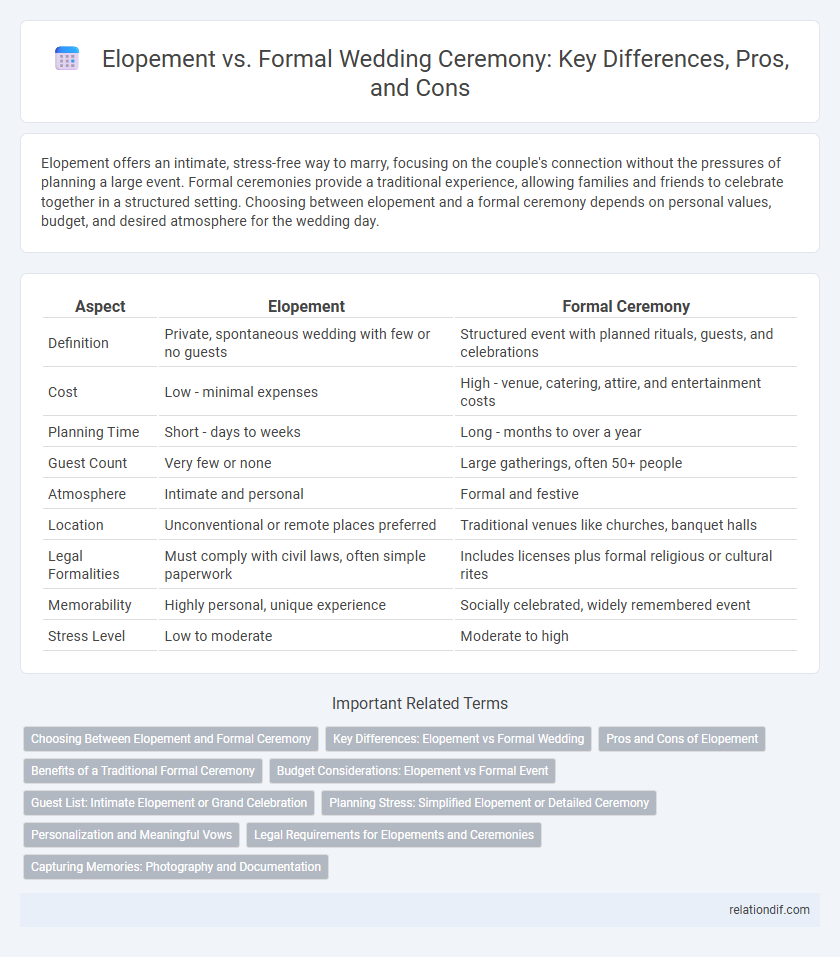Elopement offers an intimate, stress-free way to marry, focusing on the couple's connection without the pressures of planning a large event. Formal ceremonies provide a traditional experience, allowing families and friends to celebrate together in a structured setting. Choosing between elopement and a formal ceremony depends on personal values, budget, and desired atmosphere for the wedding day.
Table of Comparison
| Aspect | Elopement | Formal Ceremony |
|---|---|---|
| Definition | Private, spontaneous wedding with few or no guests | Structured event with planned rituals, guests, and celebrations |
| Cost | Low - minimal expenses | High - venue, catering, attire, and entertainment costs |
| Planning Time | Short - days to weeks | Long - months to over a year |
| Guest Count | Very few or none | Large gatherings, often 50+ people |
| Atmosphere | Intimate and personal | Formal and festive |
| Location | Unconventional or remote places preferred | Traditional venues like churches, banquet halls |
| Legal Formalities | Must comply with civil laws, often simple paperwork | Includes licenses plus formal religious or cultural rites |
| Memorability | Highly personal, unique experience | Socially celebrated, widely remembered event |
| Stress Level | Low to moderate | Moderate to high |
Choosing Between Elopement and Formal Ceremony
Couples choosing between elopement and a formal ceremony should consider factors such as budget, desired intimacy, and guest involvement. Elopements offer a private, stress-free experience focusing on the couple, while formal ceremonies provide elaborate celebrations with family and friends. Understanding the emotional significance and logistical requirements of each option helps create a meaningful marriage experience tailored to personal preferences.
Key Differences: Elopement vs Formal Wedding
Elopement involves a small, intimate gathering or just the couple themselves, emphasizing spontaneity and minimal planning, which contrasts with the large guest lists and detailed arrangements typical of formal weddings. Formal ceremonies often include traditional customs such as officiants, receptions, and attire like wedding gowns and tuxedos, while elopements prioritize privacy and simplicity over ritualistic elements. Cost differences are significant, with elopements being considerably less expensive due to reduced venue, catering, and decoration needs compared to the comprehensive expenses of formal weddings.
Pros and Cons of Elopement
Elopement offers intimacy and lower costs, allowing couples to avoid the stress and expense of a large formal ceremony. However, it may lead to disappointment among family and friends who expect to share in the celebration, potentially causing feelings of exclusion or misunderstandings. Choosing elopement means prioritizing personal connection over tradition, but it might lack the social and cultural recognition associated with formal wedding events.
Benefits of a Traditional Formal Ceremony
A traditional formal ceremony offers a rich cultural experience, allowing couples to celebrate their union with family and friends in a meaningful, time-honored setting. It provides structured rituals that reinforce social bonds and create lasting memories through detailed planning and personalized elements like vows, music, and attire. Formal ceremonies often include legal and religious components that ensure recognized marital status and honor longstanding traditions.
Budget Considerations: Elopement vs Formal Event
Elopement typically costs significantly less than a formal ceremony, with budgets often ranging from $1,000 to $5,000 compared to $20,000 to $40,000 for traditional weddings. Elopements eliminate expenses related to large guest lists, venue rentals, catering, and extensive decorations, allowing couples to prioritize experiences or travel instead. Formal ceremonies, while more costly due to detailed planning and numerous vendors, offer a grander celebration but require careful budgeting to manage the higher expenses associated with entertainment, attire, and event coordination.
Guest List: Intimate Elopement or Grand Celebration
Elopements typically involve a small, intimate guest list limited to close family and friends, creating a personal and meaningful experience. In contrast, formal ceremonies often feature a grand celebration with extensive invitations that can include hundreds of guests, from extended family to colleagues and acquaintances. Choosing between an elopement and a traditional wedding depends largely on the couple's preference for either a private gathering or a large social event.
Planning Stress: Simplified Elopement or Detailed Ceremony
Elopement significantly reduces planning stress by eliminating extensive guest lists, venue bookings, and elaborate decorations, allowing couples to focus solely on their commitment. In contrast, a formal ceremony involves detailed coordination with vendors, invitations, and multiple events, often increasing stress levels. Couples seeking a low-pressure experience typically find elopement more manageable and emotionally freeing.
Personalization and Meaningful Vows
Elopement offers unparalleled personalization, allowing couples to craft deeply meaningful vows in an intimate setting, free from traditional constraints. Formal ceremonies often follow established rituals, but can still incorporate unique elements that reflect the couple's journey and values. Prioritizing authentic expression over scale enhances the emotional impact, making the celebration truly memorable regardless of format.
Legal Requirements for Elopements and Ceremonies
Elopements typically require the same legal documentation as formal ceremonies, including a valid marriage license issued by the local government authority. Couples must ensure that all paperwork, such as identification and witness signatures, complies with state or country-specific laws to guarantee the marriage is legally recognized. Unlike formal ceremonies, elopements often provide more flexibility in location and officiant choice but do not exempt couples from adhering to these mandatory legal requirements.
Capturing Memories: Photography and Documentation
Elopement photography offers candid, intimate moments that highlight genuine emotions without the pressure of posed shots, while formal ceremonies often involve structured, traditional photo sessions to capture every key event and guest group. Documentation of elopements tends to focus on spontaneous storytelling and natural backdrops, contrasting with the comprehensive, multi-angle coverage typical of formal weddings. Choosing between elopement and formal ceremony photography depends on whether the couple prioritizes authentic, minimalist memories or extensive, detailed photo albums.
Elopement vs Formal Ceremony Infographic

 relationdif.com
relationdif.com